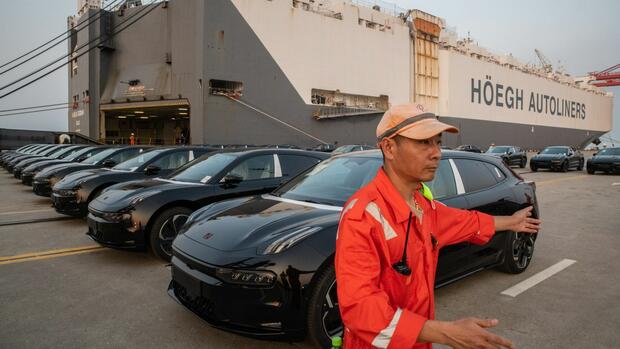Beijing, Brussels, Berlin Ursula von der Leyen has sparked concerns in Germany about a trade conflict with China. The EU Commission President had announced that she would take action against cheap Chinese electric cars. She wants to start an investigation into market-distorting subsidies, which may result in tariffs on imported electric cars.
The German economy and the federal government are now warning about countermeasures and collateral damage. Those involved recognize the problem with cheap electric cars from China. However, there are fears that an escalation of the conflict will ultimately harm Europe even more.
The federal government is currently still voting internally on how it wants to respond to von der Leyen’s plan. Federal Economics Minister Robert Habeck (Greens) welcomed von der Leyen’s initiative on Wednesday.
However, according to government circles, there is currently no consensus on his view on this. The Chancellery in particular is looking at von der Leyen’s plan with a certain degree of skepticism, it was said. In addition to possible countermeasures by China, it must be clarified who would be affected by potential punitive tariffs against China.
In the first half of 2023, 40 percent of China’s electric car exports to the EU came from the US company Tesla. However, the suspicion of market-distorting subsidies relates more to Chinese car manufacturers.
In addition, a European consensus must be found. There are certainly different interests among the member states. France’s car industry, for example, has strong domestic roots. Other EU states, on the other hand, would benefit less from measures against Chinese vehicles, but would be hit harder by countermeasures.
Economy warns of trade conflicts
Bernd Lange, Chairman of the Trade Committee in the European Parliament, believes the investigation is correct. The problem, however, is that von der Leyen had already anticipated the outcome of the test. The head of the commission said, among other things, that the price of Chinese electric cars was “kept artificially low by enormous state subsidies”.
There are even clearer warnings coming from the economy. Volker Treier, head of foreign trade at the German Chamber of Commerce and Industry (DIHK), said: “Given the current multiple crises, new trade conflicts – and certainly those with our most important trading partner China – are completely unsuitable for freeing us from the current difficult situation.”
The concerns are also great because China strongly condemned von der Leyen’s plan. The Foreign Ministry called the announced investigation a “purely protectionist act.” China is “very concerned and extremely dissatisfied” about this, a spokesman said, warning that it “will have a negative impact on economic and trade relations between China and the EU”.
>> Read here: The underestimated attackers – which strategies China’s electric car manufacturers are using to shake up the market
EU Trade Commissioner Valdis Dombrovskis is expected in Beijing at the end of the month. The high-level economic and trade dialogue is also likely to focus on the announced investigation.
There are a number of reasons that speak against a timely escalation. In Brussels it is expected that the review will not be completed until next summer. Until then, the Chinese should keep quiet.
China expert Jürgen Matthes from the German Economic Institute (IW) points out that German car manufacturers are increasingly relocating their production for the Chinese market to China. “The Chinese government has no interest in putting obstacles in the way of German car companies, it would only be cutting into its own flesh and, above all, putting Chinese jobs at risk,” said Matthes, with a view to possible countermeasures.
>> Read here: The West is going on the offensive against China
The secretary general of the China Passenger Car Association (CPCA), Cui Dongshu, also assumes that “Chinese car manufacturers have a pretty good chance of passing the EU investigation”. He told the state-run newspaper Global Times. He pointed out that most subsidies for electric vehicles have now been “largely abolished”.
USA could be a model for import tariffs on electric cars
However, the EU Commission has calculated that electric cars imported from China are on average 20 percent cheaper in the EU than those manufactured in Europe. The market share of Chinese providers has recently risen rapidly to eight percent across the EU. The commission fears that it could be 15 percent in the next few years.
The EU Commission President suspects market-distorting subsidies.
(Photo: dpa)
“Global markets are now being flooded with cheaper Chinese electric cars,” von der Leyen said. The head of the Commission could base her further approach on the USA. They already charge an import duty of 27.5 percent for electric cars.
More: BYD Europe boss – “We want to become the leading international manufacturer in Germany”

